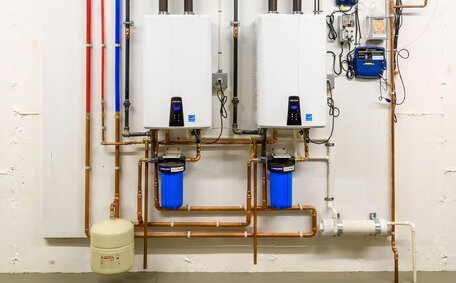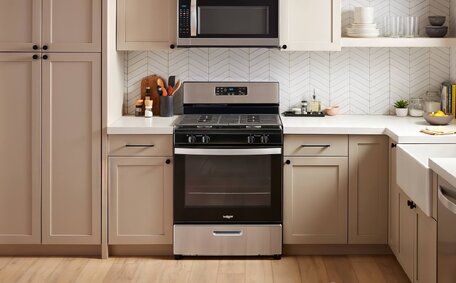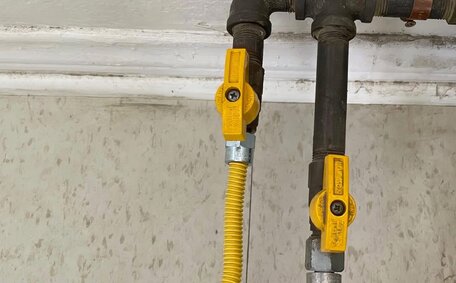
How Hard Water Hurts Hot Water Heaters
Hard water leaves mineral deposits in heaters, pipes and tanks. This limescale reduces efficiency, lifespan and hot water availability. Contact us for affordable water softening solutions.
Read MoreMulti-storey apartment plumbing demands an intricate system to maintain resident comfort and safety. Apartment plumbing comprises supply lines for fresh water, an extensive drainage system for wastewater, and fixtures like sinks and toilets.
Compared to single-story residential plumbing, multi-storey systems have stacks that move water vertically and employ horizontal underground piping across distances that often exceed those a residential plumber encounters. These systems use booster pumps and increased water storage capacity for higher pressure outputs. Cast iron, copper, PVC and ABS plastic pipes are common.
However, understanding the basics of the building’s plumbing infrastructure is beneficial, since issues in a single unit can affect the entire building.
These stacks encompass drainage from plumbing fixtures such as toilets, sinks, showers, bathtubs and similar. These include vent stacks and horizontal passages that guarantee adequate air ventilation and balance.
The soil stacks are designed to efficiently carry waste and wastewater from each level down to the ground floor. In a multifamily building, the plumbing system typically incorporates a vertical stack where pipes run horizontally and vertically.
The sewer lines and horizontal pipe runs distribute supply water throughout the complex, directing water flows to each unit and handling wastewater transport. Hot water services and cold water lines link to the vertical risers, then branch out horizontally, aligning with each floor’s water system. Waste pipes join horizontal branch lines that connect to the waste stacks.
The correct sizing of vertical stacks and horizontal pipes is crucial to manage the high volume of natural gas and water from multiple floors efficiently. Durable materials like cast iron and copper are commonly used in commercial plumbing systems, chosen and installed by knowledgeable plumbers for their resistance to pressure variations and wear.
Frequent plumbing problems in multi-storey buildings encompass:
In cold weather, exposed water pipes may freeze and burst. Prevention involves insulating pipes in unheated areas such as garages, basements, or attics. Residents can take proactive measures about their plumbing by staying informed about their faucets, allowing a small drip during extreme cold to prevent freezing.
Joints, fittings, and corrosion leaks often challenge expansive plumbing systems. Horizontal pipes in walls and vertical stacks must be accessible for inspection and repair. Be observant for damp walls or ceilings, particularly on the floor above, and address any evidence of a plumbing problem promptly.
A clog in a single unit can affect the main stack; therefore, swift action is required to clear any blockages.
To prevent blocked drains, avoid disposing of fats or harsh chemicals in the sink, an issue exacerbated by increased usage across floors.
In apartment buildings with higher elevations, maintaining consistent low water pressure on upper floors can be challenging. Plumbing systems need booster pumps and calibrated devices such as a thermostatic mixing valve for optimal performance. Residents should be alert about when to call in plumbing experts upon noticing pressure drops to address underlying issues with supply lines.
Timely detection of plumbing issues in highrise buildings is essential to mitigate damage. There are several key signs for residents and property managers to watch for:
A leak may start small but grow over time. Be vigilant for plumbing issues like dripping fixtures or wet spots on walls or ceilings, which could signal pipe leaks.
Strange noises from drains may signal partial blockages. This can lead to backups and overflows if not addressed. Report gurgling noises to building maintenance at once, as it may point to blockages causing improper drain flow.
Inconsistencies in where water comes out or water flow rates, particularly on upper floors, can be telltale signs of issues with supply lines, risers or booster pumps. Managers should inspect systems thoroughly in response.
Catch basin and drain traps are designed to prevent sewer gas smell. Strong odours may mean broken traps or vent stack problems enabling gas to enter living spaces.
By promptly reporting plumbing irregularities, our plumbing team of experts can offer comprehensive solutions that address and resolve the issues before significant damage occurs. Catching problems quickly also prevents disruptions for residents.
Determining who takes responsibility for plumbing issues, the body corporate often plays a pivotal role in multi-storey buildings, as repairs frequently necessitate access to pipes behind walls or above ceilings. Professional plumbers provide solutions such as pipe relining, which involves minimal demolition.
Pipe relining entails inserting a resin-impregnated liner into compromised pipes via an accessible point such as a drain. The liner hardens and can make a smooth, jointless interior, sealing leaks and strengthening weakened pipes.
The 'no-dig’ technique of pipe relining eliminates the need for invasive demolition to repair pipes. This method ensures quicker, more cost-efficient repairs, minimising disruption for inhabitants. Pipe relining extends system lifespan considerably.
For issues requiring pipe replacement, technicians must cut narrow access holes to reach plumbing behind walls or above ceilings. They carefully remove minimal material before patching surfaces after fixing underlying problems.
Plumbing professionals can use drain cameras and pipe locators to strategically place access points, avoiding structural elements or further damage. Selective demolition and subsequent surface restoration, although disruptive, are less impactful than entire system replacement.
In most cases, a detailed building schematic helps plumbers quickly pinpoint pipe routes and address issues efficiently, making it clearer when to call upon their expertise with less exploratory demolition.
Regular plumbing maintenance is crucial for multi-storey buildings, recognising the specialised care these buildings need to reduce plumbing issues. Professional inspections every 6-12 months can identify problems early. This includes:
Inspect roof flashings, vents, seals and pipes annually before rainy periods. Address cracked caulking, rust and leaks to prevent water intrusion.
Thoroughly inspect sanitary drainage systems with drain pipes and catch basins for cracks, leaks, blockages through camera scoping. Clear all debris and address faulty joints or alignments.
Check water tank seals, valves, supporting structures yearly. Ensure overflows drain properly. Examine pump systems and engage in pressure limiting calibration to achieve optimal pressure.
Including equipment inspections in regular maintenance minimises unexpected repairs, system failures, and water damage. It also extends equipment lifespan for improved return on investment.
Commercial plumbing services are essential for addressing persistent, intricate issues or ones posing a risk of major water damage. As specialist commercial technicians, plumbers have the expertise to accurately diagnose problems and implement appropriate repairs.
Repeated drain blockages in multiple units could indicate deeper problems within the main stacks. Only plumbers with expertise in both commercial and residential settings possess the advanced equipment and know-how to clear persistent blockages and prevent future recurrences through thorough pipe inspections.
While small leaks may be manageable temporarily, substantial flows from burst pipes or joints require immediate professional help. Technicians skilfully locate the source of a leaking pipe, stem the water loss, and have repairs carried out with minimal disruption to residents.
Commercial plumbers can install pressure gauges across floors to ascertain the cause of pressure issues, whether from the municipal supply or building plumbing. They can rectify any emerging issues through pipe upgrades, pump calibration or water tank adjustments.
For complex, unresolved or emergency plumbing situations, the licensed technicians at Picnic Point Plumbing are ready to assist 24/7. Call 1300 349 338, email jobs@picnicpointplumbingservices.com.au or book an inspection online to get help resolving persistent plumbing headaches.
Strata management prioritises safety when managing plumbing issues in multi-storey buildings with complex underground networks. Improper repairs or unqualified strata plumbing work can lead to further damage or serious risks like electrocution, flooding or fire.
Only licensed plumbers, who are also insured, have the expertise to safely troubleshoot and repair complex commercial plumbing systems. They follow codes and best practises to ensure structural and fire safety while working.
To prevent flooding accidents, water supplies should be shut off at main valves before any pipe maintenance. Professionals contain drain leaks to avoid damage. Resuming water flow requires careful checks for leaks.
Plumbing work requires compliance with safety standards, so if repairs penetrate fire-rated walls or ceilings, materials and seals must be restored accordingly. Professionals coordinate with the building manager on containing fire zones.
Plumbers securely cordon off work zones to protect residents from possible hazards such as tools or debris. They thoughtfully schedule noisy tasks and reduce dust by confining any mess from demolition.
By engaging qualified technicians and adhering to stringent safety protocols, building insurance against complex plumbing issues is achieved while ensuring the safety of individuals and property.
Hard water leaves mineral deposits in heaters, pipes and tanks. This limescale reduces efficiency, lifespan and hot water availability. Contact us for affordable water softening solutions.
Read MoreIt’s important to routinely check your gas appliances for any issues. Signs of problems include gas leaks, strange sounds, odd smells and more. Have a professional inspect your gas appliances annually and service them regularly for safety.
Read MoreUpgrading your gas meter is a simple process completed by registered technicians. It involves disconnecting your gas supply for 15 minutes to swap the old meter for a new digital smart meter. The upgrade is free and improves accuracy.
Read MorePicnic Point, 2213 NSW
We will call back as soon as possible.




